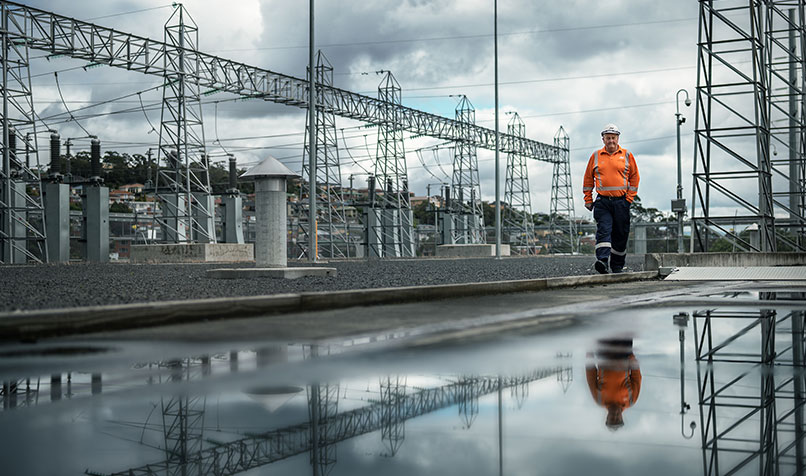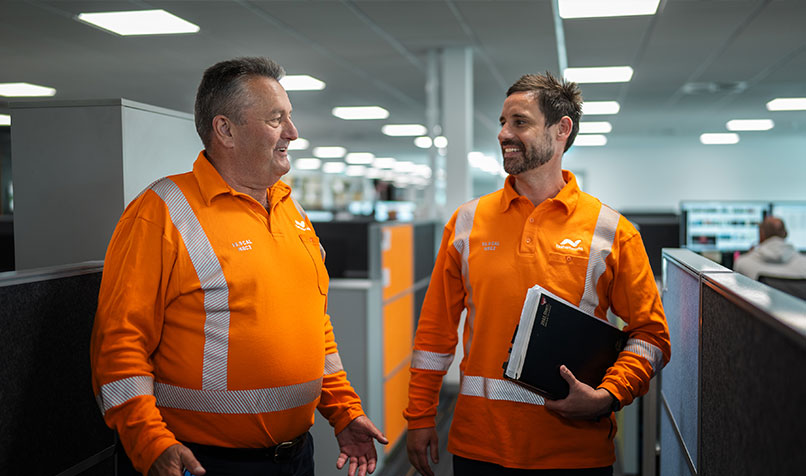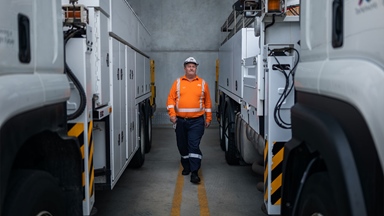Loading component...
At a glance
With more than four decades in the energy sector under his belt, few business leaders are better placed to wrangle operations at TasNetworks than Ross Burridge AM FCPA.
It is an exciting time for the company, as its subsidiary, Marinus Link, is moving through the critical design and approvals phase.
The Marinus Link is set to be a clean energy game changer for Australia, connecting Tasmania and Victoria to enable the flow of telecommunication and clean electricity in both directions.
Once completed, it will enable excess energy generated on the mainland to be stored in Tasmania’s hydro dams, which can be tapped for use when national electricity market demand outstrips supply. Any excess in Tasmania’s renewable energy and storage resources will also be available for use throughout the national grid.
Burridge, who leads executive operations at TasNetworks, says the project has enormous potential to address Australia’s renewable energy needs.
“The need for us to connect new renewable generation is growing by the minute,” says Burridge. “Marinus Link is part of the solution, because it allows us to export firm energy generation from Tasmania to the mainland.”
It also provides economic benefits to the state, “because it will encourage developers to come into Tasmania to build more generation, such as wind farms and solar farms”.
This is infrastructure on a massive scale with room to grow even further in the long term. The project has been staged with one initial 750-megawatt cable, with a second possible after the final investment decision, which has been set for December 2024.
Lightbulb moment

Burridge’s interest in renewable energy was ignited when he took up a role with Hydro Tasmania 30 years ago, which evolved into looking after strategic investments.
One such investment was a joint venture called Roaring 40s, an electricity generator project formed in 2005 between Hydro Tasmania and Hong Kong-based CLP Group. The project introduced him to the world of wind farms and the potential they offered for transitioning to clean energy sources.
“I was involved with developing and financing some of the initial wind farms in the project, but then I was also involved in the transactions to sell them into the new joint venture,” Burridge says. “It gave me exposure to the whole life cycle of managing the equity side and the project financing side of wind farms.”
After three decades with Hydro Tasmania, Burridge made the switch to TasNetworks, serving as acting CEO for one year and as general manager for strategy, finance and business services for more than seven.
"The need for us to connect new renewable generation is growing by the minute. Marinus Link is part of the solution, because it allows us to export firm energy generation from Tasmania to the mainland."
In his current role, Burridge is charged with running engineering and network operations, among them connecting Marinus Link to the Tasmanian electricity grid when it is completed.
“We need to be able to deliver power to the cable and receive power from the Marinus Link cable once it is commissioned. To do that, TasNetworks has its own A$1 billion project to bolster the North West Transmission Developments project, and that reports to me,” he explains.
While fronting up the engineering function might seem removed from Burridge’s finance and accounting background, in reality, his qualification and industry experience have made Burridge the ideal candidate to lead such a complex project.
“I think a commerce degree gives you flexibility. I run the engineering part of the business because I’ve got enough knowledge about how electricity works, plus I’ve got commercial experience,” he says.
It is that commercial nous that Burridge draws upon to explain the future economic benefits of the Marinus Link project, not just to the electricity grid and the economy, but to regular Australian households.
“The message we need to get through is that people will be paying less for their energy than they otherwise would have. We’ve got to try to demonstrate that it will actually mitigate cost pressures,” he says.
How to make Australia a renewable energy superpower
The gift of energy

Burridge is a firm believer in contributing his accounting skills and commercial acumen beyond the boardroom.
When his children became involved with Little Athletics, he volunteered as treasurer. It was not long before Burridge was appointed president of Little Athletics Tasmania and then headed up the national body.
He has been involved with the organisation for 20 years and, in 2021, was appointed Member of the Order of Australia for his service to the sport and the community.
“When I took over as president, it was a volunteer organisation in every sense of the word – and it still is – and that’s the strength of it, but at a corporate level, it needed a lot of reform,” Burridge says. “I was able to bring in a CEO and lift it to a standard that the Australian Sports Commission needed.
“Having an accounting background was useful with getting the finances in order, and there was also a fair bit of work to do on the culture.
“It was a challenge, but it is in better shape than it was a few years ago, and I’ve been pleased to be involved at that level.”
Burridge says he has also been pleased to be able to offer advice to accounting and finance graduates when they come calling.
“I suppose I’ve got two pieces of advice. The first is always do what you say you’re going to do. If you commit to having something done by a particular date, have it done.
“The other piece of advice is, if you’ve got a problem, don’t just ignore it. Escalate it, because if you just put it in the drawer and forget about it, it’ll become a bigger problem.”

